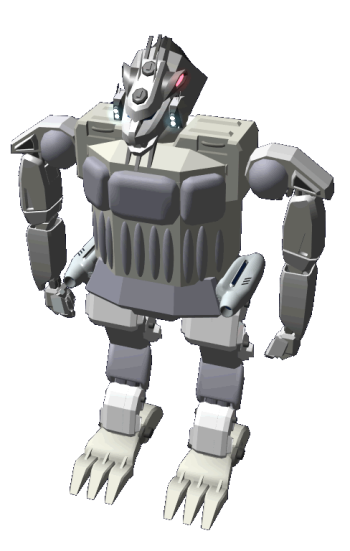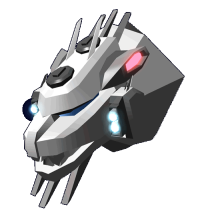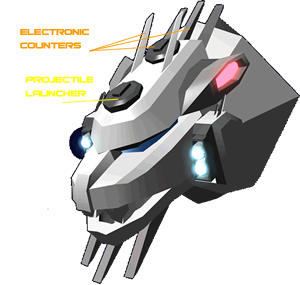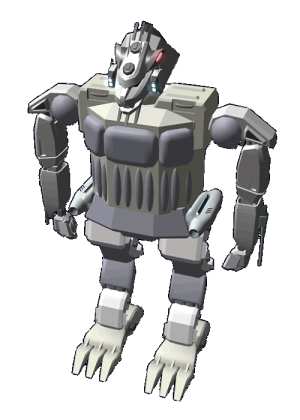Sidebar
Table of Contents
Matu'dahoka (Battle Bear) Stako Yanuto
The Matu'dahoka is the heaviest of the Stako Yanuto (Exo-Skel), designed for maximum battle capability. The current model came into production in 755 CY (YE 36).
About the Matu'dahoka
 The Matu'dahoka was the fourth generation of Stako Yanuto. The unit was built to be a formidable combat unit used by the Poku Saeruo Degonjo. The Matu'dahoka can not be operated by a Tula unless it is modified to support a smaller operator. Unlike the Goa'ismâ (Scout) Stako Yanuto this unit does not have the extend mode, but it does have the squat mode for stowage and operator entering and exiting.
The Matu'dahoka was the fourth generation of Stako Yanuto. The unit was built to be a formidable combat unit used by the Poku Saeruo Degonjo. The Matu'dahoka can not be operated by a Tula unless it is modified to support a smaller operator. Unlike the Goa'ismâ (Scout) Stako Yanuto this unit does not have the extend mode, but it does have the squat mode for stowage and operator entering and exiting.
The Matu'dahoka is designed for durability, and sacrifices the speed and agility of smaller models. The Matu'dahoka has integrated weapons on the hips, in each forearm and in the head. All of the joints of the unit are reinforced, and physically shielded.
It takes its name from a creature on the Otâgolisoy (Birth world). Because the battle unit had similar traits, they named it in honor of the animal.
History
None of the previous versions were still in service when the HS-M3-4a went into development. Working from the blueprints for the 3a, scientists used historical accounts to identify areas for improvement.
In addition, the team also looked at upgrading the design with newer technologies that were developed since they were discontinued.
Appearance
The Matu'dahoka general appearance is stylized but based on the basic form of a Qaktoro. The unit has two hip cannons that are visible on either side of the unit. The base color of all manufactured ones is a dull gray; the owning organization paints them according to their Afirmugaly (Heraldry)
Statistical Data
General
- Class: Matu'dahoka (Battle Bear)
- Nomenclature: HS-MH3-4a
- Type: Frame
- Designers: Otâmovi Wiy Jael (Silver Moon Sect)
- Manufacturer: Otâmovi Wiy Jael (Silver Moon Sect) on Poku Movi Vamâqi (Clan Void Berth)
Crew and Accommodations
Crew: 1
Dimensions
- Length: 2 meters ( 6.56 feet)
- Width: 4 meters ( 13.12 feet) at shoulders
- Height:
- Normal: 6 meters ( 19.68 feet)
- Squat: 5 meters ( 16.4 feet)
- Mass: 1,800 kg
Propulsion and Range
Speeds
The Matu'dahoka is adept frame.
- Ground:
- Walking: 24 kph 15 mph
- Running: 104 kph 65 mph
- Atmospheric:
- Requires Flight Rig - Not Avail at this time
- Space
- Requires Space Rig - Not Avail at this time
Physical ability
- Jump: 2.25 meters vertical
- Lift: 2,200 kg
Damage Capacity
See Damage Rating (Version 3) for an explanation of the damage system.
- Frame: 16 ADR
- Shields: N/A by default
Durability and Maintenance
Service Lifespan: Estimated 10 years of constant use, possibly longer with refits.
Refit Cycle: Routine updates are done by technicians from the Silver Moon Sect
Inside the Matu'dahoka
The operator sits in the cockpit which is in the torso of the unit. The cockpit is more spacious than the one in the Goa'ismâ. It has the essentials, a seat that is padded with acceleration foam. There are padded straps that hold the operator secure in the seat. There is a Iginâ Yoqa (Neural Link) in the seat that the operator can connect to. The operator enters the Stako through the back of the torso.
Behind the seat is a survival kit which the operator can remove and use in the event the unit is to badly damaged to operate or use while they effect repairs. Above the kit a small compartment in which they can store personal weapons and other items.
There are four displays at eye level that can be configured as they wish. Standard configuration is for the two center ones to display a panoramic view of what is in front of the unit. They can overlay the display with a HUD.
There are internal lights that the operator can adjust, most prefer to keep them at low levels.
There is a console with a keyboard and two control sticks. The console has controls for communications, life support.
The operator for short excursions can wear normal clothing. For long duration events they typically wear a Moviumatgo (Spacesuit) with or without the helmet, which allows them to deal with bodily needs.
Systems
Most of the systems in the Matu'dahoka are based on standard technology used within the clan.
HS-MH3-G7540x Power System
The Matu'dahoka is equipped with a modular power system that features a primary and an emergency system. Operating on the emergency system, the unit can not move faster than walking.
HS-MH3-G75400 Fusion Reactor
The Goa'ismâ uses a compact Sumanâ-a Tyokanorjopa (Fusion Reactors) and Gean Norjopa (Generator) for its primary power. It has sufficient fuel for 104 hours of operation.
HS-ML1-G75401 Fuel Cells
In the event of a failure of the primary system, the unit is equipped with a Gianaka Gean (Fuel Cells) to power life support, communications and basic movement. The cells are capable of operating for 32 hours.
HS-MH3-C75400 Control
The Matu'dahoka uses a Jodau Fiqorka (Module Brain) for its control system. In addition to physical controls in the pilot compartment, it also has a Iginâ Yoqa (Neural Link) connection for use by the operator. In the event that the operator is unconscious the system can take action to return to base safely.
HS-ML1-E75400 Communications array
The Matu'dahoka is equipped with a HS-ML1-E754/00 Communications array for its communications requirements.
HS-ML1-P75400 Musculature
The Matu'dahoka uses the HS-ML1-P754/00 Jâony Norjopa (Musculature) it uses a significantly higher number of bundles due to the size and mass of the unit.
HS-MH3-F75400 Structure
The Matu'dahoka is constructed primarily out of Mâqirây (Bound Metal). This gives the unit excellent durability. It also features additional protective panels on all major components. All of the joints are sealed to keep contaminants out and move in a manner consistent with Poku'vonai.
HS-MH3-E75402 Sensors
The Matu'dahoka uses components from the HS-AF1-E720xx Tin'sa Mâbor'a (Small craft Sensors). Some of the systems are available as options to the frame. The sensors are mounted in the head. It can fit up to two additional sensors for missions.
Standard
- HS-AF1-E72003 Targeting RADAR
- HS-AF1-E72002 Ranging
- HS-AF1-E72001 Imaging Cluster
- HS-ML1-E72002 Emission Scanner
Optional
- HS-AF1-E72000 Gravimetric Scanner
- HS-AF1-E72004 Geological Sensor
- HS-AF1-E72005 Life Detection
- HS-ML1-E75403 Chemical Scanner
HS-MH3-W75402 Counter Measures
The Matu'dahoka is equipped with the HS-MH3-W754/02 Counter Measure System located in the top of the head.
The system can fire the following physical counter measures:
HS-ML1-V75400 Life Support
The Matu'dahoka uses a compact Niufofi'a Norjopa (Atmosphere Systems). It can operate as long as the system has power. In the event of a failure there is sufficient stored gases to keep the operator alive for up to 12 hours.
HS-MH3-W75400 Akko Rotysam (Coil Gun)
The Matu'dahoka is equipped with two HS-MH3-W75400 Akko Rotysam (Coil Gun). They are mounted on the fore arms of the mecha.
HS-MH3-W75401 Sumanâ-a Rotyka (Fusion Cannon)
The Matu'dahoka is equipped with two HS-MH3-W75401 Sumanâ-a Rotyka (Fusion Cannon), which are mounted on each hip.
Accessories
Page Tools
Terms of Service - Privacy Policy



